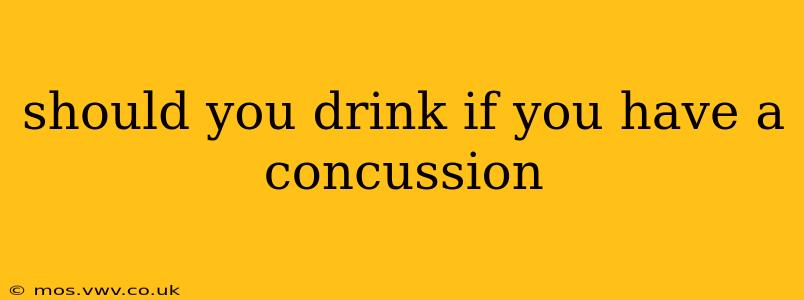Should You Drink Alcohol If You Have a Concussion? A Definitive No.
A concussion is a traumatic brain injury (TBI) that can result from a blow to the head or body, causing the brain to move rapidly back and forth inside the skull. This jarring motion can disrupt brain function, leading to a range of symptoms, from mild to severe. One thing is certain: alcohol should be strictly avoided after a concussion.
Alcohol's impact on the brain makes it particularly dangerous to consume after a head injury. Let's explore why.
How Does Alcohol Affect the Brain After a Concussion?
Alcohol is a central nervous system depressant. This means it slows down brain activity. After a concussion, your brain is already working overtime to heal and repair itself. Adding alcohol into the mix further slows down this crucial process, potentially worsening the injury and prolonging recovery.
Specifically, alcohol can:
- Increase inflammation: Concussions cause inflammation in the brain. Alcohol can exacerbate this inflammation, leading to increased swelling and pressure within the skull. This increased pressure can further damage brain tissue and delay healing.
- Impair cognitive function: Many concussion symptoms involve cognitive difficulties like memory problems, concentration issues, and slowed thinking. Alcohol worsens these symptoms, making it harder to recover.
- Mask symptoms: Alcohol can temporarily mask some concussion symptoms, leading to a false sense of recovery. This can be incredibly dangerous, as it might prevent you from seeking necessary medical attention or engaging in appropriate rest and recovery.
- Increase risk of complications: In some cases, alcohol can increase the risk of developing more severe complications after a concussion, such as post-concussion syndrome (PCS).
What Are the Symptoms of a Concussion?
Recognizing the signs of a concussion is crucial for prompt treatment and recovery. Symptoms can vary widely, but common signs include:
- Headache: Often persistent and severe.
- Dizziness: Feeling lightheaded or unsteady.
- Nausea and vomiting: Feeling sick to the stomach.
- Blurred vision: Difficulty focusing or seeing clearly.
- Sensitivity to light and sound: Experiencing discomfort in bright light or noisy environments.
- Confusion and disorientation: Difficulty remembering events or understanding surroundings.
- Memory problems: Trouble recalling recent events or information.
- Sleep disturbances: Difficulty sleeping or excessive sleepiness.
- Emotional changes: Irritability, anxiety, or depression.
- Balance problems: Difficulty walking or maintaining balance.
Can I Drink Alcohol After a Concussion Has "Healed"?
Even after the initial symptoms have subsided, it's crucial to consult a healthcare professional before resuming alcohol consumption. The brain can take weeks, months, or even longer to fully heal after a concussion, and the effects of alcohol can linger.
What Should I Do If I Suspect a Concussion?
Seek immediate medical attention if you suspect a concussion. A doctor can properly diagnose the injury and recommend appropriate treatment and recovery strategies. This often includes rest, avoidance of strenuous activity, and monitoring for any worsening symptoms.
How Long Should I Avoid Alcohol After a Concussion?
There's no single answer to this question, as recovery time varies depending on the severity of the concussion and individual factors. It is best to discuss this with your doctor or other qualified healthcare professional, who will give tailored advice based on your specific situation. Generally, avoiding alcohol for at least several weeks, if not longer, is recommended.
What about other substances?
Avoid all drugs and other substances that can affect brain function during concussion recovery. This includes illicit drugs, prescription medications not explicitly prescribed by your doctor, and excessive caffeine.
In conclusion, do not drink alcohol if you have a concussion. The risks far outweigh any potential benefits, and doing so can significantly impede your recovery and potentially lead to serious complications. Prioritize your health and consult a medical professional for proper guidance and care.
